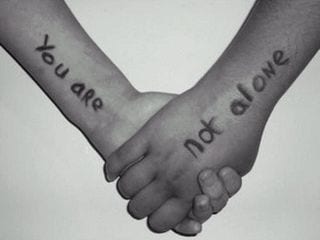Anthony Bourdain, Robin Williams, Guru Dutt, Silk Smitha, Parveen Babi and Kate Spade are a few of the millions of people the world has lost to suicide. Read on to learn more about why you should and how you can take action to support suicide prevention, and why we need to shatter the South Asian silence on suicide.
Anyone that has lost a loved one to suicide knows how devastatingly painful it is; it’s a hurt so heartbreaking that it’s hard to put into words. With almost 1 million suicides worldwide every year (on average one person dies by suicide every 40 seconds), as hard as it is, it’s a conversation we have to have. With today marking Bell Let’s Talk Day, we understand it’s a sensitive topic but it’s something we should, we want and we need to talk about.
What exactly is Bell Let’s Talk Day? An initiative that started in Canada in 2010, it hoped (and has succeeded) in getting stigma-free conversation on mental health and mental illness going. Fast forward 9 years and Bell Let’s Talk has donated approximately $93.4 million CAD to mental health initiatives. Taking place every January, it now gains interactions from people all around the world who use social media platforms to help bring attention to mental health.
The Bell initiative is important but more important is that we understand the conversations around mental health including suicide need to continue past today because the numbers of those diagnosed with mental illness and those who commit suicide continue to climb.

Why Is The South Asian Community So Silent About Suicide?
As sensitive as it is, silence around suicide will not make it stop and it’s long past time the South Asian community starts addressing it to support those suffering through thoughts and/or attempts of it alongside those who have lost someone to it. In fact, it could be the deeply rooted South Asian cultural norm of not talking about suicide is one of the reasons the numbers are so high; according to the World Health Organization (WHO) in 2016, India was ranked as 6th out of all countries measured by WHO for the highest rate or suicide in women and 22nd for men.

The South Asian Shame
One of the reasons why the South Asian community is silent about suicide could be the expectation of what defines strength in the South Asian community. Depression and anxiety are still viewed by many as a weakness instead of a legitimate mental health challenge and/or illness. South Asians are taught to work hard and please others (especially their families); to push through problems instead of addressing them. Sharing mental difficulties can be considered shameful behavior and so in fear of embarrassing themselves and their families, many South Asians who are suffering often do so in silence.
Even Bollywood Can’t Get The Message Through
The topic is so historically taboo, that even when Bollywood touched on it with some of the most beloved Indian film stars like Amitabh Bachchan, Shah Rukh Khan and Aishwarya Rai Bachchan in the 2000 film Mohabbatein, there were mixed reactions to the suicide in the film. The movie went out to receive several awards but remained a controversial topic in many households where Aishwarya Rai Bachchan’s character (who committed suicide in the film) was described as a shameful, weak and/or an embarrassing part of the movie.
Mental health challenges and/or illness are nothing to be ashamed about; they are not a sign of weakness and/or failure. Medical research together and neuroscience prove the former while the suicides of people like Guru Dutt, Anthony Bourdain, Robin Williams and Parveen Babi (all who achieved remarkable heights in their successful careers) proves the later.
What Can We Do To Stop The Startling Numbers From Climbing?
Increase our awareness: The numbers shared earlier show we simply cannot ignore suicide in the South Asian culture anymore. Mental health is real and impacts every single one of us.
Support stigma-free dialogue around mental health: We must come together to create safe spaces where people can discuss and/or share their thoughts and experiences without fear of judgment. If you’re not ready to talk you can still make a difference by being a compassionate listener.

Join the conversation: Move from listening to participating by joining the conversations about mental health, mental illness and suicide. Honest, open dialogue involves courage but remember one brave step on your end in sharing thoughts and/or experiences, can make a big difference in someone else’s journey.
Promote participating in therapy: We all have challenges and instead of continuing the South Asian cultural norm of pretending we don’t have problems and frowning upon therapy, we need to smile for and applaud those who bravely seek it. Therapy and/or counselling are productive, healthy steps that should be encouraged by all of us.
Get informed on suicide prevention: There are lots of legitimate sources you can use to increase your knowledge on suicide prevention and seek support for yourself and others.
Resources: There are numerous non-profit organizations that can help us all learn, (hotline numbers to call for help are also available on these sites):
United States:
National Suicide Prevention Lifeline
India
Canada
Main Image Photo Credit: www.psychologytoday.com
Rachna Sethi
Author
Rachna (@thesassyspiritual) is a graduate of the Applied Mindfulness Meditation program from the University of Toronto, a certified Educator with two bachelor degrees and a diploma in Art Therapy. She's dedicated to living with a compassionate approach. Committed to helping people integrate Mindfuln...














































































































